
"The Miller's Tale" is the second of Geoffrey Chaucer's Canterbury Tales (1380s–1390s), told by the drunken miller Robin to "quite" "The Knight's Tale". The Miller's Prologue is the first "quite" that occurs in the tales.
"The Merchant's Tale" is one of Geoffrey Chaucer's Canterbury Tales. In it Chaucer subtly mocks antifeminist literature like that of Theophrastus ('Theofraste'). The tale also shows the influence of Boccaccio, Deschamps' Le Miroir de Mariage, Roman de la Rose by Guillaume de Lorris, Andreas Capellanus, Statius and Cato. The tale is found in Persia in the Bahar Danush, in which the husband climbs a date tree instead of a pear tree. It could have arrived in Europe through the One Thousand and One Nights, or perhaps the version in book VI of the Masnavi by Rumi. Though several of the tales are sexually explicit by modern standards, this one is especially so. Larry Benson remarks:
"The Reeve's Tale" is the third story told in Geoffrey Chaucer's The Canterbury Tales. The reeve, named Oswald in the text, is the manager of a large estate who reaped incredible profits for his master and himself. He is described in the Tales as skinny and bad-tempered and old; his hair is closely cropped reflecting his social status as a serf. His sword is rusty while he rides a fine gray horse called Scot. The Reeve is a skilled carpenter, a profession mocked in the previous "Miller's Tale". Oswald responds with a tale that mocks the Miller's profession.

The Metamorphoses of Apuleius, which Augustine of Hippo referred to as The Golden Ass, is the only ancient Roman novel in Latin to survive in its entirety.
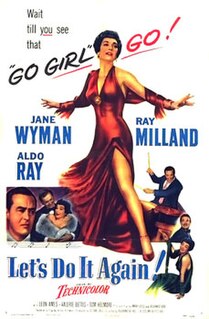
Let's Do it Again is a 1953 Technicolor musical film set in 1950 New York, and released by Columbia Pictures. The film was directed by Alexander Hall and starred Jane Wyman, Ray Milland, Aldo Ray, and Tom Helmore. It is the story of a composer's wife (Wyman) who tries to make him (Milland) jealous, but the ploy backfires and leads to divorce.

The Canterbury Tales is a 1972 Italian film directed by Pier Paolo Pasolini based on the medieval narrative poem by Geoffrey Chaucer. The second film in Pasolini's "Trilogy of Life", preceded by The Decameron and followed by Arabian Nights, it won the Golden Bear at the 22nd Berlin International Film Festival.

An exemplum is a moral anecdote, brief or extended, real or fictitious, used to illustrate a point. The word is also used to express an action performed by another and used as an example or model.

Canterbury Tales is a musical conceived by Martin Starkie and written by Nevill Coghill and Martin Starkie with music by John Hawkins and Richard Hill. Originally presented at the Oxford Playhouse in 1964, it was expanded into a full-length musical and presented at the Phoenix Theatre, London on 21 March 1968 and ran for 2,080 performances. A sequel by the same writers, More Canterbury Tales, premiered in 1976.
The Three Heads in the Well is a fairy tale collected by Joseph Jacobs in English Fairy Tales.
Śukasaptati, or Seventy tales of the parrot, is a collection of stories originally written in Sanskrit. The stories are supposed to be narrated to a woman by her pet parrot, at the rate of one story every night, in order to dissuade her from going out to meet her paramour when her husband is away. The stories frequently deal with illicit liaisons, the problems that flow from them and the way to escape those crises by using one's wits. Though the actual purpose of the parrot is to prevent its mistress from leaving, it does so without moralising. At the end of the seventy days, the woman's husband returns from his trip abroad and all is forgiven. Most of the stories are ribald and uninhibited, with some verging on the pornographic. The situations depicted in the stories not only test the bounds of marriage, some stray into taboo areas of incest and, in one case, zoophilia.
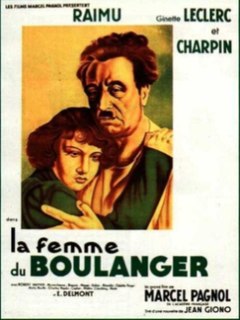
The Baker's Wife is a 1938 French drama film directed by Marcel Pagnol. It is based on the novel Blue Boy by French author Jean Giono and became the basis of the American musical The Baker's Wife.
"What Men Live By" is a short story written by Russian author Leo Tolstoy in 1885. It is one of the short stories included in his collection What Men Live By, and Other Tales, published in 1885. The compilation also included the written pieces "The Three Questions", "The Coffee-House of Surat", and "How Much Land Does a Man Need?".
The Cunning Shoemaker is an Italian fairy tale collected by Laura Gonzenbach in Sicilianische Mahrchen. Andrew Lang included it in The Pink Fairy Book.

Goodbye Lover is a 1998 neo-noir comedy film about a murder plot surrounding an alcoholic advertising agency worker and his adulterous wife. The film was directed by Roland Joffé, and stars Patricia Arquette, Dermot Mulroney, Don Johnson, Ellen DeGeneres and Mary-Louise Parker. The original script was written by Ron Peer; subsequent drafts were written by Robert Pucci, then Buck Henry.
"The Wedding of Mrs. Fox" is two German fairy tales collected under the same title by the Brothers Grimm in Grimm's Fairy Tales as number 38. It was included in all editions, and is classified as Aarne-Thompson type 65, 1350, 1352*, and 1510.

Tsuru no Ongaeshi is a story from Japanese folklore about a crane who returns a favor to a man. A variant of the story where a man marries the crane that returns the favor is known as Tsuru Nyōbō.
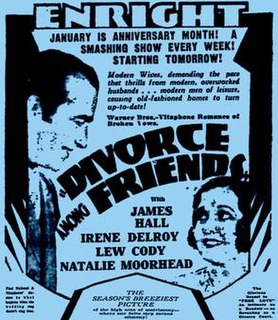
Divorce Among Friends is a 1930 American Pre-Code comedy film. The film stars James Hall, Lew Cody and Natalie Moorhead. The film survives only in a 16mm copy made in the 1950s for television.
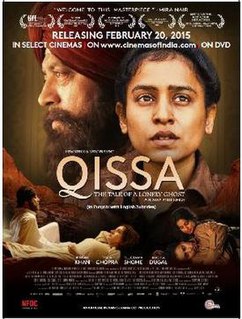
Qissa is a 2013 Indian-German drama film in Punjabi written and directed by Anup Singh. The film was released in Indian theaters on 20 February 2015 nationwide and simultaneously on DVD and VOD as well. The film was screened in the Contemporary World Cinema section at the 2013 Toronto International Film Festival where it won the Netpac Award for World or International Asian Film. The theme of the film focuses on desire of a Sikh man towards having a son to continue the family lineage.

"The Hardwood Pile" is a contemporary fantasy story by American writer L. Sprague de Camp. It was first published in the magazine Unknown for September, 1940. It first appeared in book form in the collection The Reluctant Shaman and Other Fantastic Tales ; it later appeared in the collection The Best of L. Sprague de Camp, and the anthology Bestiary! The story has been translated into French and German.
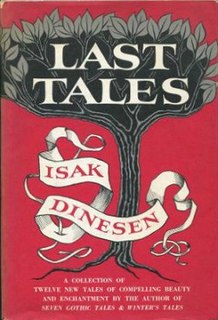
Last Tales is a collection of short stories by the Danish author Karen Blixen, which was published in 1957. The collection contains a group of stories taken from several other collections Blixen had been simultaneously working on for several years.













